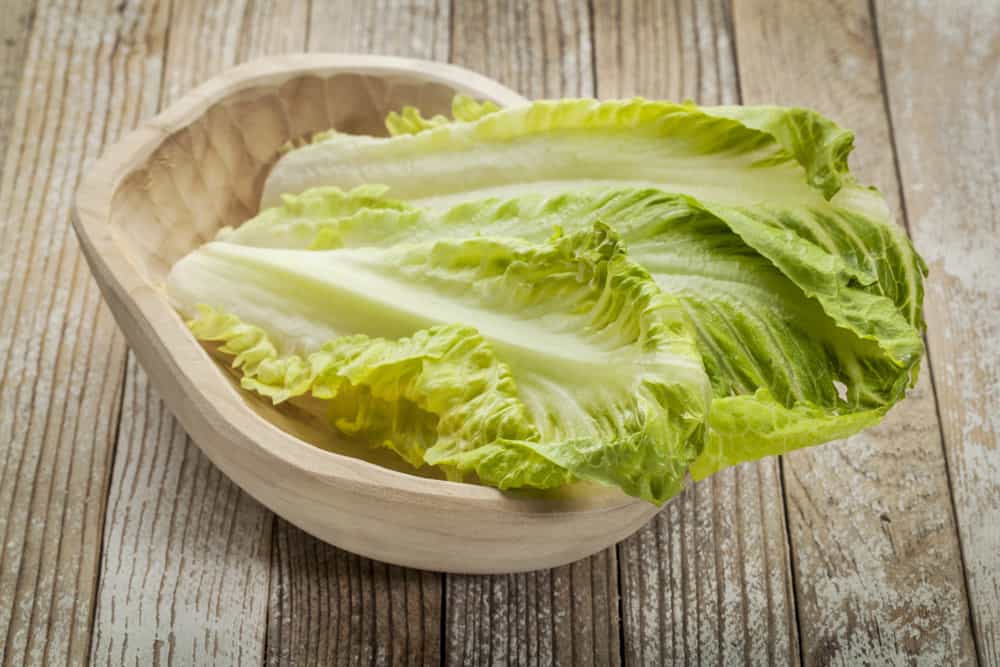Romaine Lettuce Facts:

Nutrition Facts
Serving Size 1 Cup - Shredded
Servings Per Container 1
Amount Per Serving
Calories 8
Calories from Fat 0
% Daily Value*
Total Fat 0g
0%
Saturated Fat 0g
0%
Trans Fat 0g
Cholesterol 0mg
0%
Sodium 4mg
0%
Total Carbohydrate 2g
1%
Dietary Fiber 1g
4%
Sugars 1g
Protein 1g
Vitamin A
82%
Vitamin C
19%
Calcium
2%
Iron
3%
Vitamin K
60%
Thiamin
2%
Riboflavin
2%
Niacin
1%
Vitamin B6
2%
Folate
16%
Pantothenic Acid
1%
Magnesium
2%
Phosphorus
1%
Potassium
3%
Zinc
1%
Copper
1%
Manganese
4%
*Percent Daily Values are based on a 2,000 calorie diet. Your daily values may be higher or lower depending on your calorie needs.
PQ (Protein Quality) x PDCAAS (Protein Digestibility Corrected Amino Acid Score) - 50
Additional Contents
Potential Health Benefits
- powerful anti-cancer properties
- increased cardiovascular disease protection
- digestive system health boost
- immune system health boost
- bone & joint health boost
- skin & eye health boost
- lower "bad" cholesterol
- promote weight-loss
- energy boost
- antioxidant
Potential Athletic Benefits
- Increase digestive system health for improved nutrient retention and an overall body function increase.
- Help protect bones and joints from excessive breakdown from high volume training regimens.
- Help protect against excessive oxidative stress from exposure to free radicals (especially next to roads and highways).
Glycemic Index Rank
<15 out of 100
| Rank | Value |
|---|---|
| Low Glycemic | less than 55 |
Food Sensitivity Rank
0.6 to 1 ratio
| Rank | Value |
|---|---|
| Low for Fructose Sensitivity | less than 1 (fructose to glucose ratio) |
Romaine lettuce attracts many healthy eaters for its profound nutrient profile and benefits. It contributes to many potential health benefits such as anti-cancer protection, bone and joint health, improved immune system function, lower cholesterol, and increased digestive health to list a few. Romain lettuce can be enjoyed daily by most (if you do not react negatively) and makes for a great side dish.
- Zeaxanthin and Age-Related Macular Degeneration
- Carotenoids as Signaling Molecules in Cardiovascular Biology
- The Role of Antioxidants in Skin Cancer Prevention and Treatment
- Dietary Vitamin A Intake and Bone Health in the Elderly: the Rotterdam Study
- Lowering of Cholesterol Bioaccessibility and Serum Concentrations by Saponins: in Vitro and in Vivo Studies

396kcal/serving

lutein
is a naturally occurring carotenoid vitamin found in many fruits and vegetables. It has been shown to help prevent age related eye degenerative effects, various forms of cancer, and may also assist in cardiovascular health and function.
Sources include: USDA
***All-Body Fitness takes no responsibility for the accuracy of the information provided above. Please contact a medical doctor or a registered dietitian for nutrition advice.



